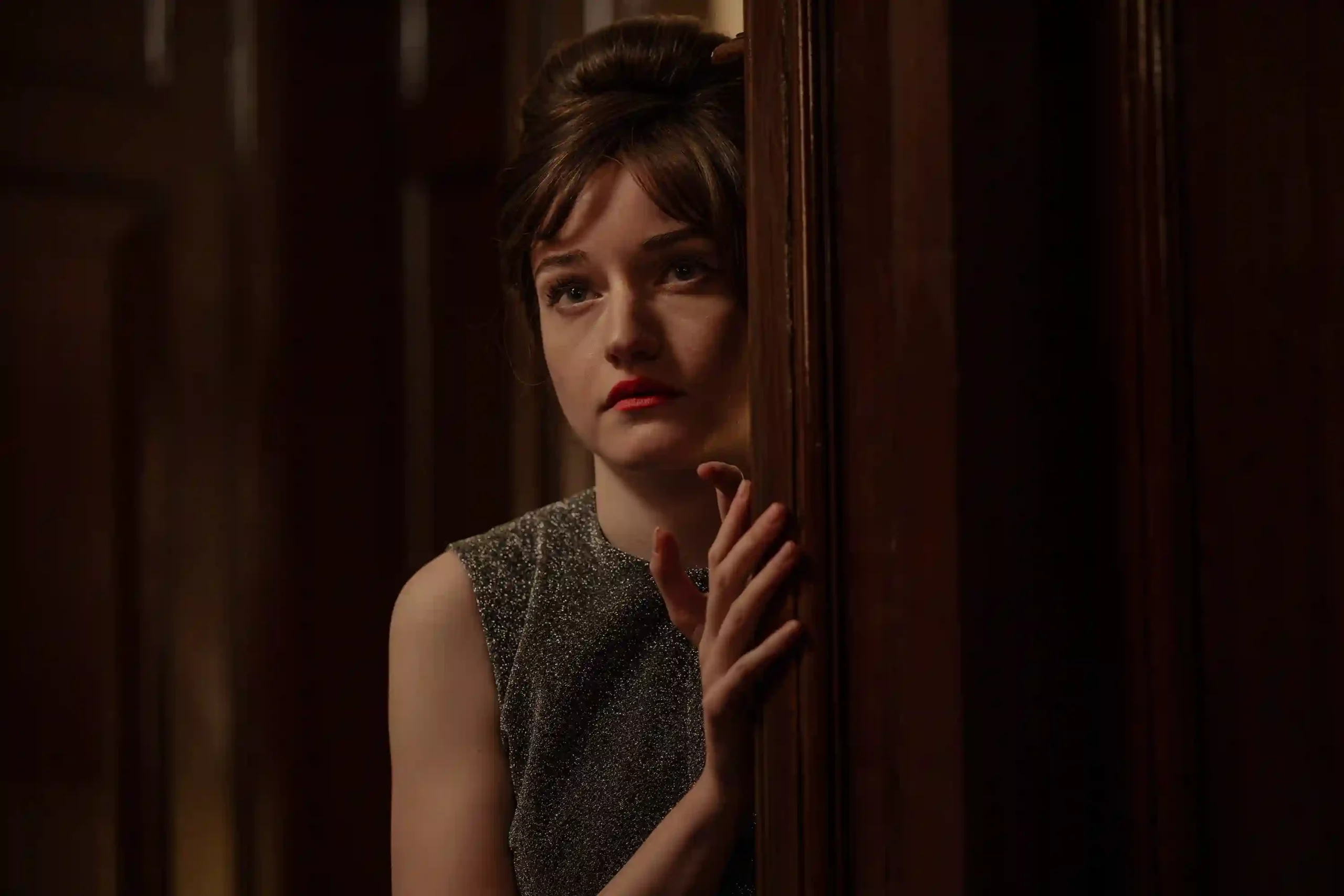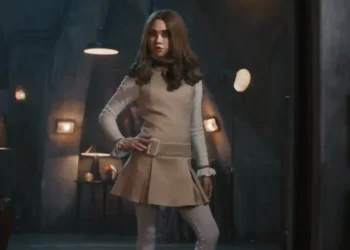Here’s our review for “Apartment 7A,” a prequel to “Rosemary’s Baby” that doesn’t exactly break any new ground but still tells a compelling enough story to keep you interested…

By Damon Martin — Editor/Lead Writer
There are plenty of memorable scenes in Roman Polanski’s classic 1968 horror film “Rosemary’s Baby” but it’s actually a couple of moments early in the movie that lend a story for the new prequel “Apartment 7A,” which lands on Paramount+ streaming on September 27.
When Rosemary Woodhouse moves into the Bramford building alongside her husband Guy, she soon encounters a young woman named Terry Gionoffrio while both are doing laundry in the basement. Terry, a recovering drug addict, sings the praises of Minnie and Roman Castevet — an elderly couple from the building who took her in when she needed it most. The young women become fast acquaintances but the friendship never gets the chance to blossom because Rosamary and her husband return home one night to find that Terry has committed suicide by jumping from the Castevet’s seventh floor window and fallen to her death on the street below.
“Apartment 7A,” directed by Natalie Erika James — best known for her atmospheric and creepy horror film “Relic” — is centered around Terry (Julian Garner), an up and coming dancer trying to make it on Broadway only to have her dreams shattered after she snaps her ankle during a horrific accident on stage during a production. In the aftermath of her accident, Terry leans on her friend Annie for support but she soon realizes that she’s becoming more and more of a burden without an ability to pay her bills and her issues are only exacerbated after she gets hooked on painkillers to deal with recovery from her injury.
Just when it looks like Terry is reaching the end of her rope, she makes one last desperate attempt to get the attention of Alan Marchand (Jim Sturgess) — a famous director who saw her audition for one of his productions — by going to his apartment building. When she’s turned away at the door, Terry ends up collapsing outside and that’s where she encounters Minnie and Roman Castevet for the first time because they also happen to live in the same exact building.
Minnie (Dianne Wiest) and Roman (Kevin McNally) take an immediate interest in the wayward girl with stars in her eyes and they offer their unconditional help her get back on her feet (no pun intended). Of course, Terry soon discovers that everything the Castevets give her comes with sinister strings attached with Satan playing the puppetmaster.
Where “Apartment 7A” succeeds is with the performances because Julia Garner — a multi-time Emmy winner — is a powerhouse in everything she does. Garner portrays Terry with a certain level of vulnerability that really makes you feel for the character as she teeters closer and closer to the edge with a hint of desperation in her eyes just trying to make her dreams come true.
Meanwhile, Wiest’s performance could have easily slipped into a bad cosplay of Minnie — a role that won Ruth Gordan an Oscar after she played the character in “Rosemary’s Baby” — she actually finds a way to make it her own. Wiest’s version of Minnie is just as overbearing and annoying but she’s also menacing with an ominous personality that bubbles to the surface during some of her interactions with Terry.
The set design and cinematography all feel authentic to that mid 1960s feel that was captured so astutely in the original. There are even a couple of musical numbers that actually fit rather well in this slow burn horror film.
Where “Apartment 7A” struggles is within the parameters of the story because the plot won’t just feel familiar — it’s downright identical to “Rosemary’s Baby.”
By the time Rosemary is screaming about her baby’s eyes and you realize that she’s just given birth the Antichrist thanks to the deal with the Devil that her husband made, you think back to Terry and the mysterious circumstances surrounding her death after she was also befriended by the Castevets. Remember, just after Terry’s death, Minnie gives Rosemary her necklace as a “good luck charm” as she soon becomes the vessel to give birth to the child that will bring about the end of the world.
So it shouldn’t come as any surprise that the Castevets are searching for that surrogate mother to impregnate with Satan’s spawn when they encounter Terry for the first time. Once they realize that she’s despondent and in need of help, they orchestrate a similar strategy to use her in the same way that they’ll eventually use Rosemary.
The biggest difference is that Terry was a Broadway hopeful just trying to make her way as a dancer while Rosemary and her husband were actually going to attempt to have children one day anyway. Terry being a single woman in New York in the 1960s provides a different approach to the Castevets’ evil intentions but the story is still much the same in the end.
Of course, Terry falling prey to the Castevets’ evil plan does manage to inject an underlying message of body autonomy when women’s rights are front and center in our current political climate. Unlike Rosemary in the original film, Terry is all by herself and she’s not interested in having a child much less giving birth to a baby just as her career starts to flourish.
That lends to a slightly different take on the story as Terry begins to realize what’s happening to her but the third act plays out in rapid-fire fashion unlike the slow burn that saw Rosemary fall apart trying to find help to save her from her own husband and his new circle of friends. Terry’s descent into madness and isolation feels rushed at times but that also keeps the film from dragging its feet too much.
There’s certainly a version of this film where James gets mired in dazzling imagery and drug-induced fever dreams but she uses those scenes sparingly in this prequel so the nightmare sequences still work without hammering you over the head like a bad acid trip. With a run time at just over 90 minutes, “Apartment 7A” is a lean film that doesn’t feel bloated but still rushed at times.
That said because “Apartment 7A” is telling you a story where you already know the end, there’s not a lot of unnecessary exposition or time spent just trying to remind you that this is a “Rosemary’s Baby” prequel. In fact one of the best parts of this film is that James doesn’t try to resurrect Rosemary and Guy Woodhouse just for the sake of tying the two movies together — there’s plenty of other connective tissue to get the point across without trying to find a mirror image of Mia Farrow and John Cassavetes for this movie.
Overall, James doesn’t try to make her film more than it is and that’s actually a credit to the director and the writers for not trying too hard to outperform the original. That’s often times the downfall for many filmmakers trying to jump back into a franchise for a prequel or sequel long after the original was released.
Instead, “Apartment 7A” shows deference to an all-time classic in “Rosemary’s Baby” while making a complimentary piece to the story without stomping on sacred ground when it comes to a much beloved original.
“Apartment 7A” gets 3 out of 5 Tarman’s








